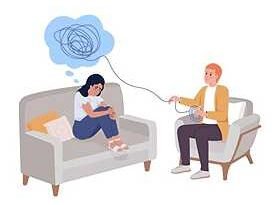The Psychology of Trauma: Pathways to Self-Recovery & Growth
Trauma is defined as an extremely unpleasant or distressing event that surpasses an individual’s capacity for coping. It can stem from a wide range of events—such as abuse, accidents, natural disasters, or loss—and its effects are not always visible. Trauma impacts the brain, body, and emotional well-being, often reshaping how individuals see themselves, others, and the world around them. The first steps to recovery and resilience are identifying the symptoms and getting assistance as soon as possible.
Types of Trauma and Their Manifestations
Trauma manifests in various forms, and its impact differs based on the nature of the experience and the individual’s coping mechanisms:
- Acute Trauma: is brought on by a single upsetting incident, like an assault or an accident.
- Chronic Trauma: Results from prolonged exposure to stressful events, like ongoing emotional abuse or neglect.
- Complex Trauma: Usually encountered during early development, complex wound involves several painful episodes, frequently of an interpersonal nature.
- Secondary or Vicarious Trauma: Experienced by individuals exposed to the wounds of others, often seen in caregivers or mental health professionals.
Common symptoms include flashbacks, nightmares, anxiety, emotional numbness, irritability, and avoidance of reminders associated with the wounds. Personal relationships, professional performance, and self-perception can all be significantly impacted by unresolved trauma.
Additionally, wounds may show up as hypervigilance, sleep disturbances, or difficulty trusting others. For some individuals, trauma is reenacted in relationships or daily life, often unconsciously, making therapeutic insight crucial for breaking these harmful cycles.
Psychological and Physiological Effects of Trauma
It deeply influences both the mind and body, altering the way individuals function in everyday life:
- Mental Health Effects: PTSD, depression, anxiety, dissociation, suicidal ideation, and emotional dysregulation.
- Cognitive Impact: Difficulty concentrating, memory issues, negative thinking patterns.
- Physical Health Consequences: Chronic fatigue, gastrointestinal issues, headaches, and a compromised immune system.
- Behavioral Symptoms: Self-harm, substance abuse, withdrawal from relationships, or aggression.
Emerging research also suggests that wounds can change brain structures related to fear, emotion regulation, and memory, such as the amygdala, hippocampus, and prefrontal cortex. This neurobiological perspective helps explain why trauma responses are not merely psychological but deeply rooted in survival mechanisms.
Evidence-Based Therapeutic Approaches to Recovery
This recovery calls for a methodical, caring, and research-based approach. Various therapeutic modalities can facilitate recovery:
- Cognitive Behavioral Therapy (CBT): Helps reframe negative thoughts and develop healthier coping skills.
- Eye Movement Desensitization and Reprocessing (EMDR): Facilitates the reprocessing of wound memories.
- Somatic Experiencing: This method focuses on letting go of wounds and tension that have been stored in the body.
- Narrative Therapy: Empowers individuals to reshape the narrative of their wounds.
- Group Therapy and Support Groups: Provide validation, shared understanding, and reduced isolation.
- Mindfulness and Self-Compassion Practices: Reduce reactivity and foster emotional balance.
Therapeutic intervention allows individuals to regain a sense of control, establish safety, and work through painful memories without retraumatization. Each person’s journey is unique, and therapy can be adapted to their readiness, cultural background, and resilience level.
When to Seek Professional Support
Seeking help is essential when wounds significantly disrupt everyday functioning or lead to emotional distress. Professional intervention is advisable if:
- There are difficulties in maintaining relationships or work performance.
- Self-harming behaviors or substance use develop.
- Flashbacks, nightmares, or intrusive thoughts are frequent.
- You feel persistently anxious, fearful, or emotionally numb.
- You have trouble feeling safe or trusting other people.
Trauma-informed therapy is advised if symptoms interfere with day-to-day functioning or last longer than a month. Even if years have passed since the event, support can still foster deep healing and personal growth.
Psychowellness Center: Expert Counselling
The Psychowellness Center, situated in Delhi NCR, is a reputable wound recovery facility. Led by Dr. R. K. Suri, a senior clinical psychologist with extensive experience in trauma counselling in Delhi, the center adopts an informed approach that combines compassion, safety, and clinical precision.
Why Trauma Survivors Trust Psychowellness Center:
- Holistic Trauma Therapy: Incorporating CBT, EMDR, somatic interventions, and mindfulness practices tailored to individual needs.
- Safe and Supportive Environment: Prioritizing emotional safety and non-judgmental care.
- Expert Team: A multidisciplinary staff trained in wound sensitivity and long-term recovery.
- Personalized Care Plans: Addressing not only symptoms but also root causes, relational patterns, and long-term resilience.
- Continuous Monitoring and Follow-Up: Guaranteeing long-term development and psychological health.
Dr. Suri’s integrative and empathetic methods empower survivors to reclaim their sense of self, safety, and hope. Survivors often express feelings truly heard, respected, and strengthened through their healing journey under the center’s guidance.
TalktoAngel: Online Counselling for Recovery, Anytime, Anywhere
TalktoAngel is a digital mental health platform that connects wound survivors with trained professionals, offering online counselling sessions at their convenience. For individuals who prefer remote access or live in underserved regions, this platform offers timely, confidential, and effective care.
Benefits of Counselling with TalktoAngel:
- Trauma recovery calls for a methodical, caring, and research-based approach.
- Diverse Therapist Pool: Specialists in wound, PTSD, abuse recovery, and grief.
- Therapist Matching: Find professionals based on language, experience, or therapeutic style.
- Flexible Modalities: Sessions may include CBT, EMDR, mindfulness, and self-compassion exercises.
- Confidential and Affordable: Full privacy and transparent pricing.
TalktoAngel makes professional recovery accessible, helping individuals begin their healing journey with the right support. The platform eliminates geographical, logistical, and emotional barriers to therapy, making recovery both practical and empowering.
Conclusion
Trauma may reshape one’s inner world, but with the right support, healing is possible. Recognizing the pain, seeking help, and engaging in therapeutic work can lead to profound transformation.
Whether through in-person sessions with Dr. R. K. Suri at the Psychowellness Center or flexible, expert care through TalktoAngel, the best mental health wellness clinic in Delhi, trauma survivors have accessible and compassionate pathways to recovery. With evidence-based treatment, emotional safety, and personalized support, it is possible to rebuild, renew, and reclaim a life of purpose, connection, and inner peace. Healing from trauma is not just about surviving; it’s about learning to live again—with confidence, clarity, and a stronger sense of self.
References
American Psychological Association. (2023). Trauma. https://www.apa.org/topics/trauma
Van der Kolk, B. (2014). The Body Keeps the Score: Brain, Mind, and Body in the Healing of Trauma. Penguin Books.
Herman, J. L. (1997). Trauma and Recovery. Basic Books.
Shapiro, F. (2018). EMDR Therapy: Basic Principles, Protocols, and Procedures. Guilford Press.




